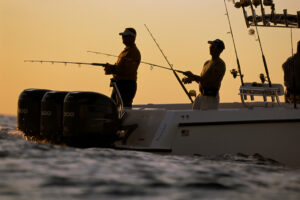
Outboard boat engine fires are a serious problem, as they put lives at risk and threaten to maroon you at sea. Good fire protection practices can keep you safe while you’re on the water.
Now that we are in boating season, it’s a suitable time to look at boat engine fire safety. Outboard engines are common, and the risk of fire is very real—make sure you always have a fire extinguisher on board. But if you practice good fire protection practices and use common sense, you can minimize the risk of fire. Boat owners should take the following steps to prevent fires.
Engine Electrical System
A considerable number of fires on outboard engines start in the electrical system. Most notably, the voltage regulator, or the electrical connections to it, are often the culprit.
This problem is mainly a concern for older engines, those older than 10 years. The best way to avoid a fire caused by a voltage regulator is to replace it every 10 years. It’s an easy and inexpensive fix that can protect you from a fire.
The Battery
Another common cause of fires on outboard boats is the battery. When reconnecting your battery in the spring, be careful to avoid switching the positive and negative connections, shorting out the battery with a metal tool, or reconnecting in series when they should be in parallel.
Some suggestions to help you avoid these mistakes are to take a picture of your battery and its connections before you disconnect it so that you have a reference point. You can also label your battery cables, or mark the positive cable with red paint or nail polish.
It’s also important to check your battery and connections for damage—pitting, rust, or leakage. A battery in disrepair is another potential cause of fires.
Fuel Leak
This is important. As one may expect, fuel leaks are a major cause of fires. Hose clamps experience vibration whenever your boat is running, leading to a fuel leak. You should remove the cowl and check your fuel lines at least twice per season. You should also check it if you smell gasoline fumes. Tighten your hose clamps or replace them if they’re damaged, and make sure that any fuel that has leaked onto the boat is thoroughly cleaned up.
You should also use great caution when adding fuel to the tank(s) and check your fuel lines to make sure they are in good condition and are not becoming permeable. You can do this with a careful inspection and by running a cloth down the line. If the line is shiny or is showing significant wear, it’s time to replace them.
Fire Protection Services from Fireline
Whether you need smoke detectors, fire extinguishers, or an automatic sprinkler system installed at your commercial property, Fireline has you covered. We have been protecting
people and property from fire damage since 1947—and our experience shows in our excellent work! We are known for our superb customer service, our expertise, and our reliability. For more information on how we can help your residential or commercial property, visit us online or give us a call at (800) 553-3405. We are in Baltimore, MD, with a second office in Leesburg, VA. For more fire safety tips, be sure to follow us on Facebook, Twitter, and LinkedIn.
